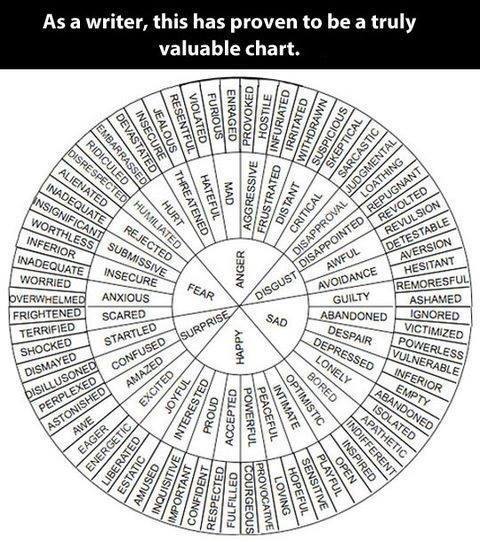Text
i spend hours in the garden

i walk alone to the store

7K notes
·
View notes
Text
meet me inside
Ensemble: HERE COMES THE GENERAL!
Aaron Burr: this should be fun!
George Washington: wot in tarnation!
355 notes
·
View notes
Text
Awesome Theatre Resources
Physical Health as a Performer
Tips for Staying Healthy
Why Actors Must Take Care of Their Bodies
Mental Health as a Performer
Channeling Emotional Intensity
Burnout
Healing Through Creative Expression
Dealing with Painful Emotions
Monologues
List of Action verbs to get you started
How to Score a Script
Choosing a Monologue
20 Monologue Tips
Stage Makeup
Basic Guide to Applying Stage Makeup
Contouring Tutorials (for many face shapes and skin tones!)
Smokey Eye tips, tricks, and hacks
Lip Tricks
Ben Nye website
MAC website
Shakespeare
Tips for Acting Shakespeare
Complete Works of Shakespeare
Scanning Lines
Auditions
Nailing Your Audition
Why Auditioning is an Art
10 Tips for a Great Audition
Audition Tricks
Overdone Material
Why You Didn’t Get Cast
What to Wear
Age Appropriate Audition Songs
Where to Find Auditions
Backstage
Playbill
UPTA
SETC
NETC
The Union
Actor’s Equity
Equity Contracts Explained
How to Get Your Card
Equity Membership Candidate Program (EMC)
Choosing a College Program
10 Theatre Programs to Kick Start Your Career
Finding the Right BFA program
Big list of MT programs by state
Headshot/Resume Resources
How to Make Your Resume Stand Out
Proper Format
10 Tips to a Great Headshot
Professional Headshot Advice
What to Wear for Headshots
Online Presence
Tips on Boosting your Online Presence
Creating Your Website
Do’s and Dont’s of Your Website
Finances
Tips to Better Finances
Tax Deductions
Investments Actors Should Make for Their Career
Actor Attire Needs
Capezio website
Bloch Website
Discount Dance
Vocal Technique/Music
How to Handle your Vocal Break
Learning to Sight Sing
Music Theory Basics
Piano Basics
Singing for Non-Singers
Acting the Song
Maintaining a Healthy Voice
How to Choose the Right Voice Teacher
Check how your medication impacts your voice!
Dance
Online Dance Classes
Online Dance Classes
How to Nail your Dance Call
Other
Music Theatre Dos and Don'ts
10 Commandments of Being an Actor
10K notes
·
View notes
Text
You may hate theatre kids but no one hates theatre kids as much as theatre kids do
14K notes
·
View notes
Photo
okay so i'm getting this from the depths of my personal blog and i'm getting a lil sad bc we did an all female version of 1776 for our spring musical

APUSH The Musical Part One: songs from musical theater that explain concepts from apush chapters 2-26 of american pagent
8tracks / playmoss / youtube
1. Molasses to Rum from 1776: explains the triangle trade as well as the hypocrisy of the revolutionary era on the topic of slavery
2. Sit Down John from 1776: the apprehension of moderates to declare independence during the continental congress
3. But Mr. Adams from 1776: the declaration of independence (this is partly on here bc it’s about jefferson wanting to bust his nut)
4. Non-Stop from Hamilton: the formation of the federal government, the constitutional convention, and the federalist papers
5. Cabinet Battle #1 from Hamilton: arguments between federalists and democratic republicans over assumption, excise taxes on whiskey, and slavery
6. The Room Where It Happens from Hamilton: the dinner that jefferson hosted which decided assumption as well as where the capital would be located
7. The Election of 1800 from Hamilton: the election of 1800 would lead to the creation of political parties
8. Alll American Prophet from Book of Mormon: the formation of mormonism and its westward expansion
9. Rock Star from Bloody Bloody Andrew Jackson: the anti-elitist sentiments that would lead to an increase in populism as well as how jackson’s anti-elitist populism contradicted with his own superiority complex
10. Corrupt Bargain from Bloody Bloody Andrew Jackson: the bargain which got JQA elected during the tie breaker for the election of 1824
11. Populism Yea Yea from Bloody Bloody Andrew Jackson: the rise of populism and jacksonian democracy
12. Ten Little Indians from Bloody Bloody Andrew Jackson: the awful awful treatment of native americans (especially during jackson’s administration)
13. Someone In a Tree from Pacific Overtures: the treaty of kanagawa and the “opening” of japan
14. The Wild Wild West from Harvey Girls: westward expansion and the wild west
15. Paint Your Wagon from Paint Your Wagon: the california gold rush and westward expansion
16. A Peculiar Institution from Civil War: the awful awful treatment of slaves
17. The Glory from Civil War: the civil war in general
18. The Ballad Of Booth from Assassins: john wilkes booth’s assassination of abraham lincoln
19. The Ballad of Guiteau from Assassins: charles guiteau’s assassination of president garfield because he wanted to place chester a arthur in power so his faction would reap benefits of patronage
20. The Bottom Line from Newsies: business owner’s cost cutting methods which often disenfranchised the workers
21. The World Will Know from Newsies: the organization of labor unions against big business during the gilded age
22. The Ballad of Czolgosz from Assassins: leon czolgosz’s assassination of president william mckinley because he felt the working class was oppressed
4K notes
·
View notes
Video
and this second part
THIS IS WHAT DREAMS ARE MADE OF
1K notes
·
View notes
Video
okay irrelevant to journaling and studying and stuff but appreciate will roland
he’s….waving through a window to say hi to corey
1K notes
·
View notes
Photo

Press Ctrl+F or ⌘F to do a quick search!
bookboon // for accounting, business, economics & finance, engineering, IT & programming, languages, marketing & law, natural sciences, statistics & mathematics (+ career & study advice, strategy & management)
booksee // for arts & photography, biographies & memoirs, business & investing, computers & internet, cooking, entertainment, health, history, home, law, literature & fiction, medicine, references, religion, science, sports, travel, and other categories
bookstacks // for popular classics
boundless // for accounting, algebra, art history, biology, business, calculus, chemistry, communications, computer science, economics, education, finance, management, marketing, microbiology, music, physics, physiology, political science, psychology, sociology, statistics, U.S. history, world history, writing
california learning resource network // for mathematics, science, history
ck-12 // for elementary math, arithmetic, measurement, algebra, geometry, probability, statistics, trigonometry, analysis, calculus, earth science, life science, physical science, biology, chemistry, physics, sat exam prep, engineering, technology, astronomy, english, history
college open textbook // for anthropology & archeology, art, biology & genetics, business, chemistry, computer science, economics, engineering & electronics, english & composition, health & nursing, history, languages & communication, law, literature, math, music, philosophy, physics, political science, psychology, science, sociology, statistics & probability
Keep reading
81K notes
·
View notes
Photo
I WAS TRYING TO FIND THIS AND I FOUND IT I AM DEAD



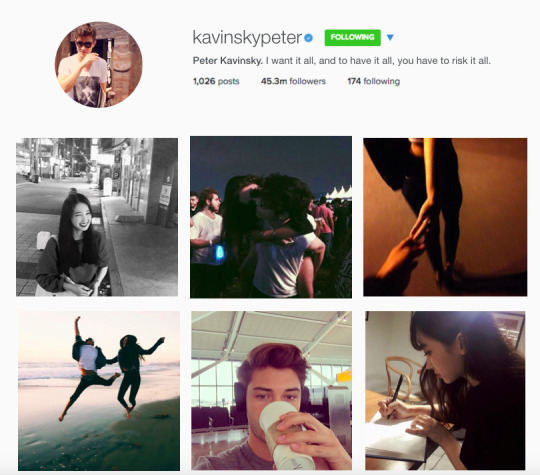

Lara Jean Song Covey + Peter Kavinsky from To All The Boys I’ve Loved Before by Jenny Han
4K notes
·
View notes
Photo



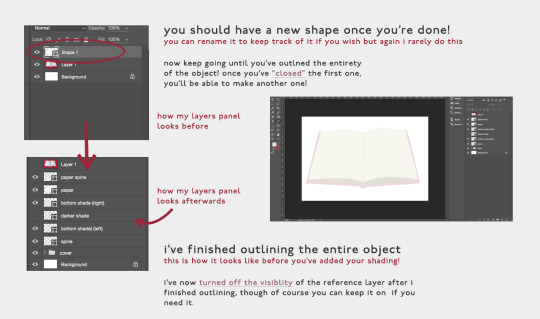
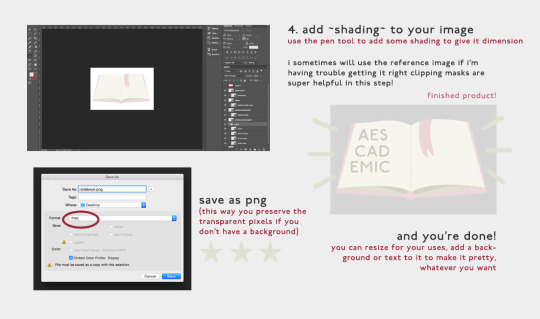
how i make vector graphics / [click for high res!] → by popular demand, this is how i make vector graphics! i hope this is helpful and feel free to ask if you have anymore questions. —tia ♪
[+++] answered design questions / all uploads
6K notes
·
View notes
Text
Resources to Get You Through the School Year!
I struggle with finding a list of resources to use during the school year, and I find that these help a lot for me when I procrastinate my time away…
As a sophomore in high school, my favorites include:
1) Castle Learning
If you’re lucky enough (but also unlucky at the same time) to have a teacher use castle learning, take advantage of it! the self - studying choice is so great to review for tests in class or exams. The program will give you options for what chapter or unit to study from too. the only downside is that my teacher gave us 300 questions per week.
2) Hemingway Editor
This website is perfect for essays. It underlines all issues with your essay and analyzes your writing level and words you use too often. its a great way to check for passive tone.
3) Localingual
The page opens to a picture of a map. By clicking each of the countries, you can hear phrases and names of countries and capitals in both female and male voices. Be weary user - submitted audios. This resource is perfect for language learning or getting familiar with popular AND unpopular languages. You can even hear the country’s national anthem!
4) Symbolab
This graphing calculator works well when your’s is dead, and also has a color feature for each of the lines. You can save your graphs.THE WEBSITE GETS EVEN BETTER BECAUSE you can have a different, normal calculator for all different kinds of maths (Algebra, Trig, even Chemistry) with steps. IT DOESN’T STOP THERE THOUGH: you can even use a NOTEBOOK to keep tracks of topics and problems. It also has a group feature for working together and cheat sheets.
5) Pinterest
Not only can it present you with recipes to help you eat healthy, it can also give you tips on how to take exams and understand them (SAT vs. ACT), it can also give you more studyblr inspiration and tips for writing essays. For language learners, it gives great resources of words or phrases that are updated.
6) Youtube
You can find how-to’s, PBS Crash Courses in several subjects (the Chemistry series is by Hank Green and the Literature and US History series is by John Green and they’re my favorites). Tons of information can be found for every subject, just make sure you don’t get distracted!
7) Wolfram Alpha
This is so good for all subjects and has endless information all subjects! Great for trying to understand an aspect of a lesson, too.
8) RefMe
This is great for helping writing your citations! I use this v often too. Not much to say about this, but it’s pretty simple.
9) Spotify/Podcast sites or apps
For spotify, you can find white noise or lofi music that you wouldn’t find on apple music. There’s a student discount for premium (50% off). Podcats are great for expanding your knowledge or getting in the know for politics, and Spotify has some smaller ones too! Spotify actually has great language ones too.
10) Google Docs/Google Keep/Google Drive/Google Photos
THE BEST APPS FOR DOCUMENTS. These are all free with a Google account (god bless) and they give you 15 GB of free storage, and you can upgrade.They all sync automatically across all devices, too. When I’m on my phone, I can easily edit a document, which is great when it’s due that day (THAT’S SAVED ME SO MANY TIMES TOO). I love these apps sm.
Hope these help you guys, let me know if any of them saved you! I know the social media ones were pretty obvious but you never know! Reblog if used!
2K notes
·
View notes
Text
Minimalistic school glow up
Glow up for the studyblr minimalist. Tips on how to stay pretty, healthy and on top of your school work while being clutter free!
Skin - Glycerin attracts moisture and works as a primer. ACV restores skin ph. Salicilic acid (aspirin) and vitamin c (oranges lol) make your skin glow. Don’t use products with bad alcohol or any kind of fragrances.
Teeth - brush teeth with a powdered tooth paste. It’s better for your health (no additives to make it liquid) and better for the environment (more transportable). Add in baking soda or activated charcoal to give a whitening effect.
Makeup remover - taking off your makeup with oil is fine.
Nails - Most nail polishes are toxic.
Hair - Sleep on a satin pillow case, only wash your hair with shampoo 2 times a week. Don’t brush, detangle with your fingers. Protect the ends of your hair with an oil. For shiny hair, rinse with ACV.
Shaving - first scrub with sugar and olive oil then use coconut oil for shaving. Mens razors are better and cheaper.
Sun protection - most sun screens are toxic. Zinc cream doubles as an UVA filter. Products like shea butter have a low SPF, carrot oil has a high SPF and you can actually make it yourself.
Health - Heal your gut. Start with taking probiotics and eating at least 500 grams of (raw) vegetables a day. Like eat a bag of carrots every day.
Vitamins - Wake up with the sun and go outside at least half an hour a day to get your vitamin D. Other supplements you should considerate are vitamin b12, magnesium and zinc.
Exercise - Work out everyday.
Cheap diner ideas - wraps with beans and lettuce; coconut milk, curry paste, vegetables and rice with nuts; zucchini noodles with carrot and (white) beans; chili with tortilla chips. Lots of herbs.
Garden - growing your own herbs and vegetables like radish is cheaper and healthier than things from the super market.
Frozen - buy frozen food, it’s is cheaper and healthier.
Stationary - All you need for college is a your planner/bullet journal, markers, a pen and one notebook for all your subjects. Just start an index so you have a place where you can find exactly what you need.
Digital - Type up your notes every day on your laptop.
Apps - Use OneNote, pocket and Mendeley.
Desk - only put stuff on your desk you actually need. I have all my stuff in a transportable cart so I can place it near my desk and when I go to sleep I put it next to my bed.
Take five to ten minutes before studying to go through everything on your desk and take off anything that you are not immediately using to study.
Don’t keep stuff from previous semesters - you don’t need it! “I should look up that paper from three semesters ago…” said NO ONE EVER.
Clothes - 10 t-shirts, 2 jeans, 2 shorts, 2 jumpers, 1 cardigan is enough. Use the time you needed to pick your clothes
Shoes - one pair of boots, one pair of sandles, high heels and sneakers is more than enough.
Socks - buy the same pairs of socks, you don’t have to roll them up. Just toss ‘em in the drawer.
Shopping clothes - don’t buy anything. Only if you love it. And if you love it, buy more of it. Like if you love a t-shirt, buy it in another colour. And whenever you buy a bra, buy more than one piece of panties that match.
Shopping in general - don’t buy stuff. Spend your money on experiences like getting drunk, thank me later lol. If you don’t drink just go to the zoo or something like that.
Washing - just wash your clothes by hand they’ll look better in the long run. Also buy one bowl, one glass, one… you name it.
Social media - don’t use it. Don’t browse on your phone. Delete every account you don’t necesserily need, except your tumblr.
Dorm - If you’re moving, get one bed (or just a mattress), a desk, a lamp and a chair and some place to store your clothes. And a plant or two. Everything else is extra. If you want to decorate, just change your wallpaper.
Clutter - makes you stressed. College is already stressful enough. Declutter. Throw away duplicates.
Selfies - clutter your phone. They don’t have any purpose. Take photos of special moments with your friends instead.
Good luck xx
413 notes
·
View notes
Photo
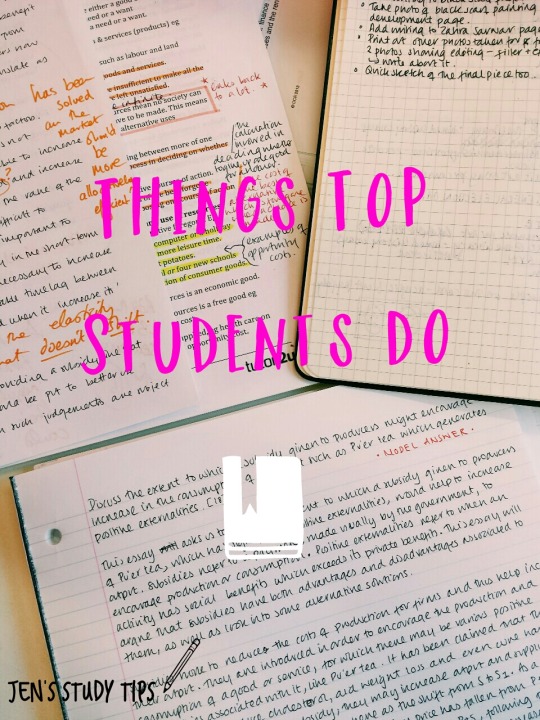
Things Top Students Do
1. They don’t always do all of their homework.
In college, homework assignments generally make up 5-20% of your grade, but can be the biggest time-suck for most students. Yes, working problems is one of the best ways to turn new concepts into working knowledge, but a large majority of those problems that take you hours and hours to work through, you’ll never see on an exam.
2. They never “read through” the textbook.
Per time spent, reading the textbook is one of the least effective methods for learning new material. Top students use the examples and practice problems, but otherwise use Google, lecture notes, and old exams for study materials.
3. They Google EVERYTHING.
It’s like an automatic reaction. New concept = go to Google for a quick explanation. Don’t think just because your professor gives you a textbook and some examples on the blackboard that you’re limited to that information. You have a massive free search engine at your fingertips, so make use of it.
4. They test themselves frequently.
Testing yourself strengthens your brain’s connections to new material, and gives you immediate and clear feedback on whether you know something or not. Bottom line, repeated self-testing significantly improves long-term retention of new material.
5. They study in short bursts, not long marathons.
Studying in short bursts tends to help you focus intensely because you know there is at least a short break coming.
This also fits in nicely with our Ultradian Rhythm, the natural activity/rest cycle of our bodies, which makes studying continuously for multiple hours on end counterproductive.
6. They reverse-engineer solved problems.
It’s one thing to follow and memorize a set of steps to solve a calculus problem. It’s an entirely different thing to understand what a derivative is, be able to take derivates of complex functions, know when to use the chain rule vs. the product rule, etc. The problem with simply following the steps the professor provided, or the textbook outlines, is that you’re only achieving a surface-level knowledge of the problem. Top students, instead,take solved problems and work backwards, from solution to question, asking “why.”
Why did this get this value? Why did they simplify this expression? Why did they use that type of derivative rule?
By following this process, you begin to understand the interconnections of the concept, and how to directly apply that to a problem. This “working knowledge” of a concept is key to performing well on exams, especially on problems that you haven’t seen before.
7. They don’t own a highlighter.
Highlighting anything = unengaged reading. If you want to note something that stands out, underline and write a corresponding note to go along with it. Or better yet, write yourself a note summarizing the item in your own words.
8. They sleep–a lot.
The daily routines of top performers, in any field, are characterized by periods of intense work (4-6 hours per day) followed by significant quantities of high-quality sleep (9 hours per night). You see this trend in top violin prodigies and chess champions, as well as elite athletes. The idea is to alternate periods of intense work with rest, so that you create tons of new connections in your nervous system, and then allow adequate time to assimilate those gains.
9. They engage themselves by asking questions.
What happens if I tell you, “Thomas Jefferson almost single-handedly drafted the Delcaration of Independence in 1776.”?
You might say “Hmm.. that’s interesting”, try to remember it for later, maybe even write down a note or two.
But what if I ask you, “Who was Thomas Jefferson?” What changes?
You start searching your memory, sifting through images of old guys, founding fathers, thinking about the Declaration of Independence. You come up with your own narrative, and then realize that you have gaps.
When was he around again? And why was he so important?
You’ll probably find yourself going to Google to fill in the gaps. Through that process your learning will be much more deeply seated in your brain than anything your history teacher ever told you about him. That’s the power of asking questions.
10. They make the best out of lecture.
Yes, your professor sucks. Yes, lectures are boring. Yes, it’s either too fast so you can’t keep up and miss all the important stuff, or it’s way too slow and you start zoning out because you already understand everything.
The best students look at this this way: I’m going to be there no matter what, so what’s the best use of my time while I’m in the classroom? Ask questions, bring the textbook and look stuff up, focus on the important practice problems to copy down in your notes, try to anticipate what the professor is going to say, make note of anything they put emphasis on as a potential exam topic. All of these things make the time you have to spend in lecture more productive and engaging. And that’s less time you have to spend studying later on.
11. They over-learn.
School is hard enough, with the amount of studying and homework you have to do. And on top of all of that Facebooking you have to get done? It might seem ridiculous to suggest learning more than you have to.
What!? Are you insane!?
But this is precisely what top students do. And paradoxically, they end up spending less time trying to understand how to do homework problems, andless time studying for exams because of it. Because when you “over-learn” past what’s presented in class, you build a better framework for the subject.
Think of trying to remember some details about Abraham Lincoln’s life. You try to remember the dates of the Civil War, or what he said in the Emancipation Proclamation. You study the same facts over and over and over again… but it’s just boring, and you quickly forget. But what if you knew his whole life’s story? About how Lincoln suffered from bouts of depression, and his relationship with his wife suffered? You start to learn that the dude was human, and you start to relate to the things he did and the struggles he went through. Now you’ve constructed a story in your head. And studies show that humans learn best through stories. So yes, it’s more information, but your brain knows what to do with it now that all those random facts are linked together. More learning, but less rote memorization and struggling to remember random facts.
12. They immediately study their exam mistakes.
Most students get their exam grade back, flip through to see if the professor made any mistakes they can argue about, and then promptly shove it into their notebook, never to be seen again until the mad scramble at the end of the semester to study for the final.
Instead, top students ignore what they got right, and use their mistakes as an indicator of what to improve on.
13. They’re busy with work and side projects.
Yes, to do well in a course, you need to focus and put in the hours. But like many geniuses throughout history have shown, involvement in a diverse set of subjects, activities, and skill sets keeps you active, and provides you with a rich and diverse set of mental models to pull from.
Also, as they say, “If you need to get something done, give it to the busy person.” If you stay active in multiple areas, you don’t have time to procrastinate, and are forced to be efficient with your study time. This generally translates into quicker learning and better performance throughout the semester.
14. They use lecture as a detective mission.
Though completely unaware of this fact, your professor has tells. Yes, like in poker. Tells during lecture will hint at particular types of concepts and problems that will be emphasized on the midterm or final exam. The best students pay attention to topics professors spend a seemingly inordinate amount of time on and make note. Chances are you’ll see something related on the final.
15. They don’t wait for motivation to strike.
Motivation comes and goes, but studying for a degree requires persistence and consistency. Just like Olympic athletes train even on their worst days, the best students figure out how to get their coursework done when it’s the last thing they want to do.
16. They practice under test conditions. The old adage “practice makes perfect” isn’t totally true. Deliberate practice under the right conditions, with the correct mindset, is more like it. Instead of reading through all of the lecture notes and redoing old homework problems, top students make themselves practice exams, and rehearse their exam performance, under time pressure and in similar conditions (no notes, uncomfortable chair, quiet room, etc.) to what they’ll see on test day.
17. They use old exams.
Professors aren’t the most inventive folk. Along with coming up with lecture material and departmental responsibilities, they’re also primarily concerned with research. So typically midterms and final exams more or less look alike for similar courses year-to-year and even across universities. Because of this, old exams are a gold mine of opportunity for figuring out what problems you should be able to solve and study from.
18. They make their own study guides.
The best students don’t simply use the study guide the teacher provides, they create their own.
Creating the study guide is half the battle, requiring you to go through your notes, consolidate them, and organize them in a way that you understand–all valuable study activities. You’ll also be able to use your equations sheet much more effectively on the exam itself (if allowed) because you know exactly where everything is.
19. They actually write on paper.
Writing out notes on a laptop is efficient. Too efficient. Because it’s so easy to quickly type out exactly what the professor is saying, you don’t have to do the work of trying to figure out how to consolidate the information into your own shorthand. Some also believe that the act of writing helps retain more information.
20. They use the 80/20 rule.
Yes, some students who get good grades do every reading assignment, finish every practice problem, and attend every study session they can get their hands on. But these students are missing the point. There will always be an endless amount of information you could learn given the time and effort, but having the ability to discern what is worth learning will truly set you apart.
Top students identify the 20% of concepts they need to learn deeply, in order to determine 80% of their final grade. They focus intently on those few things, and simply ignore the rest. This is a formula for high performance, without hours and hours of busywork. And it translates seamlessly into the real world too.
21. They don’t complain.
Complaining simply has no place in the smart student’s repertoire. If something sucks, change it or ignore it, but don’t waste your time, energy, and mental state talking about it. Got a crappy professor? Either switch class sections or focus on teaching yourself. Horrible textbook? Find alternate resources (Google is free in case you hadn’t heard).
22. They learn by doing.
Any technical subject can only truly be internalized through use. Just like learning a new language, learning to be fluent in algebra or calculus requires active application of rules and formulas. Top students know there is a big difference between knowledge, and applied knowledge.
23. They take personal responsibility for learning the material.
The best students understand that they, and only they are truly responsible for their own education. So waiting to be spoon-fed by your professor and doing the homework assignments will never be enough. Despite your school’s best intentions, they’ll never be as committed to your academic success as you can be.
24. Following what they love
Those students you admire are passionate about what they are learning. They have the drive to develop their learning further based on their love of what they are discovering. This may not always be the case and is often unavoidable but if you follow what interests you and cultivate a curiosity of this area, your motivation to learn will thrive.
Not every student is the same and many top students don’t follow the status quo. The best way to create good habits for students is to try a variety of techniques and figure out what works for you.
25. Question your teachers Thinking outside the box is a cliche but certainly a reality for students. They question everything–especially test questions they get wrong. This attitude is important because it shows a general inquisitiveness that is essential in learning. As any parent of small children knows, questions are a way to gain knowledge. Teachers can’t be offended when a student asks a difficult question and parents should encourage this behavior.
26. They know the best way to study.
It is important to know the best way to study for yourself. Do you need pictures? Sounds? Study better in quiet or noisy environments? Figure out what works best for you so that you can make the most out of your study time.
27. They play hard.
We all know that a balanced lifestyle is the best way to stay mentally and physically healthy! Top students don’t spend all day in the library grafting (contrary to what you might think!) Rather, they take the time to put their studies aside and do something which is fun and exciting!
Source : 1 2 3 4
53K notes
·
View notes
Photo
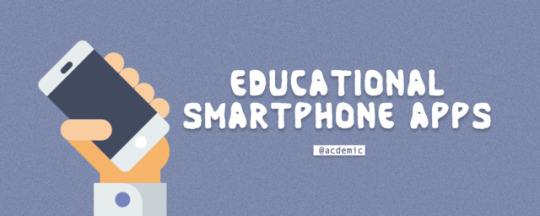
hey hello hi!!! it’s been ages (6 months?!) since my last masterpost, and i’ve been seeing so many great educational apps on the google play store. so here’s a list of some educational smartphone apps that you should check out!
disclaimer: i have not used most of these applications (i generally don’t use study or even productivity apps), so i’m recommending them based on reviews!
general education
curiosity [ play store, free ] [ apple, free ] curiosity is a super cool app that’s all about learning new quirky facts! every 24 hours new content is released, including mind-blowing science, history and technology facts. it’s like having the best museum and the most fascinating library at your disposal.
coursera [ play store, free ] [ apple, free ] with coursera, you can access more than 1,000 courses and specializations developed by 140+ of the best colleges and universities in the world, and master subjects from python programming and data science to photography and music.
edx [ play store, free ] [ apple, free ] edx provides free online courses from the world’s best universities and institutions. there are so many topics to discover, including computer science, engineering, history, psychology, nutrition, big data, statistics and hundreds more. with edx, you have the flexibility to learn on your schedule. it is free education, when and where you want it.
khan academy [ play store, free ] [ apple, free ] khan academy allows you to learn (almost) anything for free. browse over 10,000 videos and explanations at your fingertips in math, science, economics, history, and much, much more. sharpen your skills with over 40,000 interactive practice questions with instant feedback and step-by-step hints. khan academy is a wealth of resources and it’s all free! note: i really really recommend khan academy! it is super helpful and there’s also the free sat prep (and the upcoming free lsat prep for people interested in law school)!!
udemy [ play store, free ] [ apple, free ] udemy is your place to learn real world skills online. with over 32,000 online courses and tutorials, offered in more than 80 languages, you can choose from a wide range of topics to inspire creativity, hone your skills, be your own boss, and more. courses in everything from programming, it & software, business, marketing and entrepreneurship, health, design, languages, music, and much more.
goodwall [ play store, free ] [ apple, free ] goodwall is basically a social network for students - you can share your skills and achievements and win scholarships (and even be recognized by colleges and universities!) when you join, you are eligible for a $500 weekly new student award, in addition to the $1000 student of the month scholarship. people seem to think that it’s a great way to connect to other motivated students throughout the world (obviously the studyblr community is The Best ;) but here’s an awesome alternative!)
schoold [ play store, free ] [ apple, free ] schoold is a super cool app that allows you to find information on 3000+ colleges and 25k+ scholarships by major and admission chance. It also offers free college counseling (advice on applications, financial aid, majors, and careers) and future planning tools!
science
phywiz [ play store, free ] need help with your physics homework? phywiz provides step by step solutions for questions in over 30 physics topics, including kinematics, forces, gravity, and quantum physics. ask phywiz a question like "if mass is 6 and velocity is 7, what is momentum?“ and get your answer immediately. many of the positive reviews call it “one of the best apps i’ve ever used”.
little alchemy [ play store, free ] [ apple, free ] [ website ] this is such a cute game where you start with four elements and combine them to create interesting, fun and surprising items. it’s definitely addictive!
chemistry quiz [ play store, free ] 500+ quiz questions covering the elements, the periodic table, bonding and interactions, matter and mixtures, chemical reactions, acids and bases, organic chemistry, nuclear chemistry, history of chemistry, and labs.
skyview [ play store, free ] [ apple, free ] a beautiful and intuitive stargazing app that uses your camera to precisely spot and identify celestial objects in sky, day or night. it’s a great app for people who love space but don’t want to purchase fancy equipment to enjoy its beauty. you can see what each star and planet is and where it’s going. be sure to calibrate it first!
coding
encode [ play store, free ] encode is packed with bite-sized coding lessons that combine succinct explanations and clear real-code examples. it is a wonderful way for beginners to start programming.
sololearn has a ton of apps that are all about learning to code: java, c#, python, javascript, c++, etc.!
programming hub [ play store, free ] [ apple, free ] your one-stop solution to learn all of the top programming languages! you can learn c, c++, java, html, javascript, r, css, vb.net, c#, python 2.7, python 3, linux shell scripting, swift, sql, jquery, and assembly 8086. there are over 1800+ pre-compiled programs with output for practice and learning. a new feature seems to be the programming-related interview questions that can help you prepare for a job interview!
codenza [ play store, free ] codenza is a dictionary of 3000+ ready-made computer programs: the ultimate coding encyclopedia for university curriculum. codenza covers everything from computer graphs to artificial intelligence! note: codenza does not teach programming. it only provides programs and offers explanations for the more complex programs.
math
cymath [ play store, free ] [ apple, free ] [ website ] stuck on a math problem? cymath allows you to enter your problem, and helps you to solve it step-by-step. topics include pre-algebra, algebra (equation solving, factoring, logarithms, exponents, complex numbers, quadratic equations, trigonometry, partial fraction, polynomial division, etc.), and calculus (product rule, quotient rule, chain rule, u-substitution, integration by parts, integration by partial fraction, trigonometric substitution, rationalizing substitution, etc.)
photomath [ play store, free ] [ apple, free ] math is full of symbols that we are inconvenient to type, and photomath solves that problem: simply point your camera toward a math problem and photomath will show the result with detailed step-by-step instructions. there is a new feature of handwriting recognition as well!
mathway [ play store, free ] [ apple, free ] [ website ] yet another math problem solver! this one allows you to type your problem or scan a picture of your problem. mathway covers basic math, pre-algebra, algebra, trigonometry, precalculus, calculus, statistics, finite math, linear algebra, chemistry, and graphing. one flaw seems to be that you need to be online for it to work, but otherwise, it’s a fantastic tool!
history
history timeline [ play store, free ] okay, woah. this is a detailed timeline of world history with thousands of entries! it includes world history (events, nations, leaders, and wars) AND history of science, art, literature, music, and philosophy.
today in history [ play store, free ] [ similar apple, free ] for the history enthusiast who wants to learn something new every day: today in history tells you what historical events happened on that day! it works offline and you can choose from over 50 languages.
ancient history encyclopedia [ play store, free ] [ website ] thousands of informative and reliable articles on ancient history. articles are written with students in mind and are carefully reviewed to ensure accuracy, and are easy to read.
languages
duolingo [ play store, free ] [ apple, free ] one of the leading language learning apps, duolingo gives you the ability to learn english, spanish, french, german, italian, portuguese, dutch, irish, danish, swedish, russian, ukrainian, esperanto, polish, and turkish for free. you can practice your speaking, reading, listening, and writing skills and improve your vocabulary and grammar.
productivity
forest [ play store, free ] [ apple, $1.99 ] forest is a cute productivity app that keeps you off of your phone! you set a certain amount of time, and during that time a tree ‘grows’, but if you use your phone before the times up, the tree dies. :(
habitica [ play store, free ] [ apple, free ] have you heard of ‘gamification’? habitica is an app that allows you to gamify your tasks! check off tasks to level up your avatar and unlock features such as armor, pets, skills, and even quests! it’s a great way to have fun while being productive! note: habitica is another one of these apps that i’ve actually attempted to use - it is super cute and it’s definitely a great way to stay on track!
timetune [ play store, free ] timetune is a great app for people who have established a daily routine or would like to. you can set up a routine (or multiple routines) and add your daily tasks. it can be used as a daily task reminder, student calendar, timetable planner, routine schedule organizer, routine optimizer, habit creation tool, daily time manager, or daily planner.
ike [ play store, free ] ike is a to-do list that uses eisenhower’s priority matrix. you can organize your tasks by importance and urgency, and add all sorts of details such as due dates and location reminders.
habithub [ play store, free ] habithub is based on seinfeld’s productivity secret, which involves building long streaks of days that will motivate you to keep moving forward. (snapchat for habits? i think yes!) it includes a full calendar view for every habit, reminders, compatibility with smartwatches, the option to write notes every day, more flexible goals, the ability to categorize your habits, and graphs that show you how you’re doing. the interface looks beautiful and people seem to love the abundance of settings.
pomotodo [ play store, free ] [ apple, free ] there is an abundance of pomodoro timers in the app store, and pomotodo is one of them! pomotodo easily syncs across platforms, has advanced to-do list options, the ability to customize pomo and break times, offers background noise to keep you focused, and sends you weekly email reports to help you track your productivity. i don’t want to list a ton pomodoro apps in this masterpost, but here are the many options on google play store!
alright, that’s all i’ve got for you today !! i hope that this was helpful, and feel free to send me an ask with any questions, suggestions for future masterposts, or your recommendations for other study apps/websites!! :) have a great day!
icon by madebyoliver
8K notes
·
View notes
Text
this was the first creative thing i've written in a long time. i'm happy i wrote it and that people like it
i was into you. but gave up because i wasn’t brave enough to go after you. after you, there was another i was into. i went after him and i fell. i fell hard for him. so hard that my heart shattered. i was broken. but then you came back into my life and then into my heart. thank you for fixing me and being the one that i needed most.
49 notes
·
View notes

